Engender blog
GUEST POST: Who says what? A breakdown of gender bias in news topics and reporting
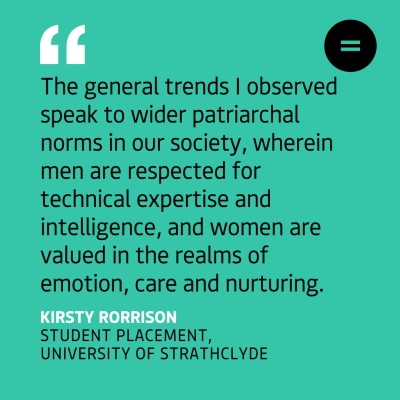 Today we're publishing the next in a series of blogs from the current student placements Engender is hosting from the University of Strathclyde Applied Gender Studies and Research Methods course.
Today we're publishing the next in a series of blogs from the current student placements Engender is hosting from the University of Strathclyde Applied Gender Studies and Research Methods course.
In the second of three posts, Kirsty Rorrison continues research into gender bias in political news reporting during the COVID-19 pandemic. Here, she looks specifically at the breakdown of bias in topics and authors, as well as whose voices are missing in the reporting of the pandemic. You can read Kirsty's first post here.
As my placement with Engender is nearing its end, I have finally completed my research on gender, COVID-19 and media. In this blog post, I’m going to discuss what I found out in my investigation and why it was crucial that I delved a bit deeper into this topic. As I mentioned in my previous post, my main area of interest in this research has always been the ways in which women in politics are represented. However, I also wanted to look at how other women, and more broadly gender, appeared in news coverage of coronavirus. For this research, I ended up coding 108 news stories. I took note of the topic, the gender of the journalist, and the identity markers of every person mentioned in each article. I wanted to see where gender appeared in news coverage, whether this related to the kinds of topics being discussed, the journalists who wrote about them or the people mentioned in articles. In this blog post, I will outline what my analysis revealed about journalists and news topics - in other words, who is writing, and what are they writing about?
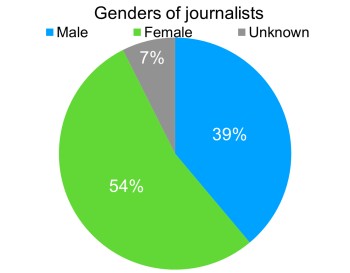
[Figure 1]
I was surprised to find a fairly even split between male and female journalists in my sample [Figure 1]; in fact, women were actually writing about COVID-19 more than men. At first glance, I thought this might suggest that journalism has become more equal in terms of gender. However, upon closer inspection, I realised that things weren’t as progressive as they seemed. While men and women were both reporting on the COVID-19 pandemic, the topics assigned to journalists varied significantly with gender. I found that women were far more likely to cover stories on public health and the NHS than their male counterparts, whereas reporting of politics and economics was often carried out by men. This is consistent with previous work on women in journalism - ‘hard’ news stories relating to industry and politics tend to be given to men, while women are relegated to covering so-called ‘softer’ topics like health, social care and education. This is not true in every case, and I did record instances of women writing about politics and business. However, the general trends I observed speak to wider patriarchal norms in our society, wherein men are respected for technical expertise and intelligence, and women are valued in the realms of emotion, care and nurturing. A breakdown of the article topic by gender of the journalist is shown below [Figure 2].

[Figure 2]
I’d spent quite a while exploring what journalists had been reporting on when I suddenly thought to myself, “what about the topics which aren’t being written about?”. I’d combed through 121 news stories over a seven day period, but I hadn’t encountered anything about domestic violence or caring responsibilities. While these topics hadn’t come up, I’d read multiple articles about planning holidays around travel restrictions. It’s a well-known fact that domestic violence, for instance,
GUEST POST: Women’s Representation in the Scottish Local Council Elections 2022: What We Know So Far
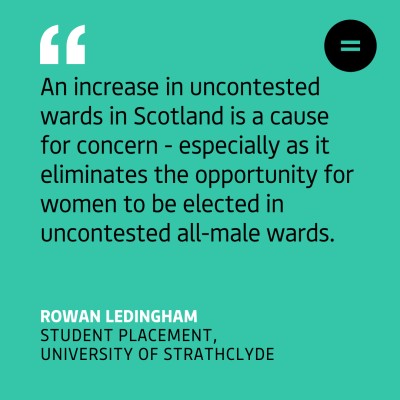
Today we're publishing the next in a series of blogs from the current student placements Engender is hosting from the University of Strathclyde Applied Gender Studies and Research Methods course.
In this post, Rowan analyses women's representation in the upcoming local council elections, and explores issues around uncontested wards, re-standing rates, and press coverage of the elections. You can read Rowan's first blog here.
With the local council elections just around the corner, it is a good time to reflect on what we know so far before people across Scotland head to the polls. As part of my ongoing research and placement with Engender I have analysed a number of areas related to the upcoming elections including candidate selections, re-standing rates among incumbent councillors, and press coverage. This blog will address each of these areas in turn.
Trapped: the call for a more flexible world
Fran Macilvey is an Edinburgh-based author. Her memoir ‘Trapped’ tells the story of her life with cerebral palsy. She has also published two self-help books which she thinks of as ‘gleaning something valuable from forty years of making mistakes’ and has recently finished writing three novels about women’s experiences with the law.
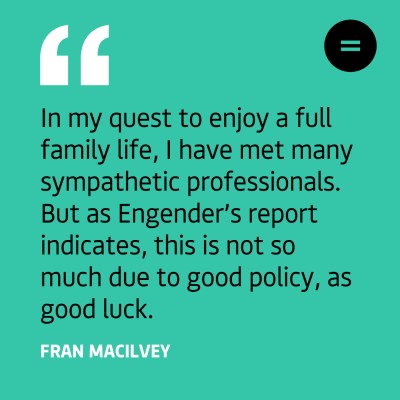
As part of a series of events being organised by Edinburgh Libraries to mark International Women’s Day on 8th March 2022, I was asked to take part in a panel discussion. Our brief, to publicise the life and work of an Edinburgh-based woman (or group of women, why not?) brought me to Engender, who invited me to contribute a guest post to ‘On the Engender’. I’m delighted and honoured to have this opportunity.
Reading Engender’s 2018 report, Our Bodies, Our Rights has been a vindicating – and at times, depressing – experience. It is a brave and realistic assessment (at last!) of the gaps in health and social provision that hinder disabled women in exercising their private and reproductive choices; in effect, their most basic human rights. Whether to have intimate relationships – read that again – whether to get married and have children, and how to bring them into adulthood while running the gamut of inconsistent and unpredictable help from professionally-minded others with rather mixed agendas. Thorny personal decisions which, as often as not, we have to navigate alone, in the face of fairly generalised ignorance and many misplaced good intentions. But this is only one aspect of the price that I, and countless others, continue to pay in our efforts to participate in mainstream life.
GUEST POST: Stand with the pro-choice voice across the US
Feminist across the world have continued to watch in horror as reproductive rights are under attack in the USA. In this blog, Jane Carnall, an activist with Abortion Rights Edinburgh sets out why we must act in solidarity with those seeking access to abortion in the states.
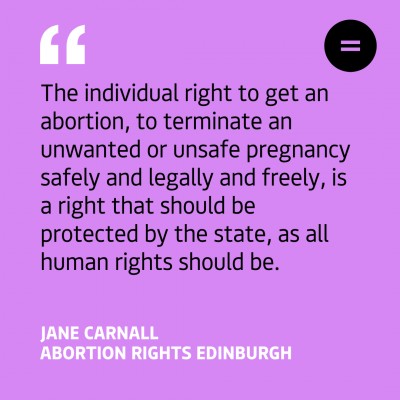
This month, a law passed by the Republican majority governing Texas came into force, and effectively banned all legal abortion in the state of Texas after six weeks gestation - that is, well before most people would even realise they're pregnant.
On 2nd October, Abortion Rights Scotland is taking part in the international day of action against this legislation.
GUEST POST: Bridging the gender health gap
Women and girls face signiï¬cant barriers to good mental and physical health. Historic lack of funding for, or professional focus on, health issues that disproportionately affect women, or affect women differently to men, can mean that these issues are not equally accommodated for in health services or awareness-raising initiatives. This anonymous guest blog explores gendered health inequalities and what progress is being made on bridging the gender health gap.
-400.png)
It took roughly six years of medical appointments before a tentative diagnosis of chronic pain – a condition that, by definition, is pain lasting longer than three months despite treatment. Part of the issue was that the pain, among other symptoms, had never really been treated; it was repeatedly misdiagnosed, from appendicitis to pregnancy, and continuously dismissed as stress or growing pains.
It was a strange relief to eventually be referred to an endometriosis specialist and women’s heath physiotherapist session, though the relief was short-lived – while I did receive some pain management, the former concluded that the pain did not appear severe enough to suggest the presence of the condition, nor warrant further investigation, and the latter prescribed mindfulness. Like many others, until recently I had never heard of endometriosis – despite its high prevalence rate and top ranking in the NHS’ 20 most painful conditions. I also found that, like many other people, my experience of healthcare was not unique. In recent years, there has been increasing awareness and recognition of such experiences as symptomatic of a wider issue: a gender disparity in medical research, knowledge and treatment that has amounted to a gender health gap.
Downloads
 Engender Briefing: Pension Credit Entitlement Changes
From 15 May 2019, new changes will be introduced which will require couples where one partner has reached state pension age and one has not (‘mixed age couples’) to claim universal credit (UC) instead of Pension Credit.
Engender Briefing: Pension Credit Entitlement Changes
From 15 May 2019, new changes will be introduced which will require couples where one partner has reached state pension age and one has not (‘mixed age couples’) to claim universal credit (UC) instead of Pension Credit.
 Engender Parliamentary Briefing: Condemnation of Misogyny, Racism, Harassment and Sexism
Engender welcomes this Scottish Parliament Debate on Condemnation of Misogyny, Racism, Harassment and Sexism and the opportunity to raise awareness of the ways in which women in Scotland’s inequality contributes to gender-based violence.
Engender Parliamentary Briefing: Condemnation of Misogyny, Racism, Harassment and Sexism
Engender welcomes this Scottish Parliament Debate on Condemnation of Misogyny, Racism, Harassment and Sexism and the opportunity to raise awareness of the ways in which women in Scotland’s inequality contributes to gender-based violence.
 Gender Matters in Social Security: Individual Payments of Universal Credit
A paper calling on the Scottish Government to automatically split payments of Universal Credit between couples, once this power is devolved to the Scottish Parliament.
Gender Matters in Social Security: Individual Payments of Universal Credit
A paper calling on the Scottish Government to automatically split payments of Universal Credit between couples, once this power is devolved to the Scottish Parliament.
 Gender Matters Manifesto: Twenty for 2016
This manifesto sets out measures that, with political will, can be taken over the next parliamentary term in pursuit of these goals.
Gender Matters Manifesto: Twenty for 2016
This manifesto sets out measures that, with political will, can be taken over the next parliamentary term in pursuit of these goals.
 Scottish NGO Briefing for UN Special Rapporteur on Violence Against Women
Joint briefing paper for the UN Rapporteur on Violence Against Women.
Scottish NGO Briefing for UN Special Rapporteur on Violence Against Women
Joint briefing paper for the UN Rapporteur on Violence Against Women.

Newsletter
Sign up to receive our newsletter here:
Sign up to our mailing list
Receive key feminist updates direct to your inbox: